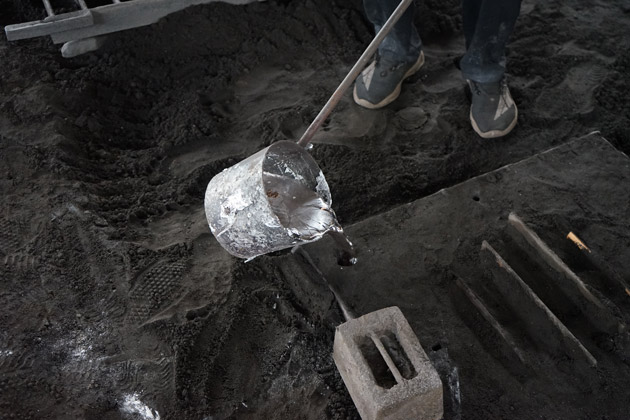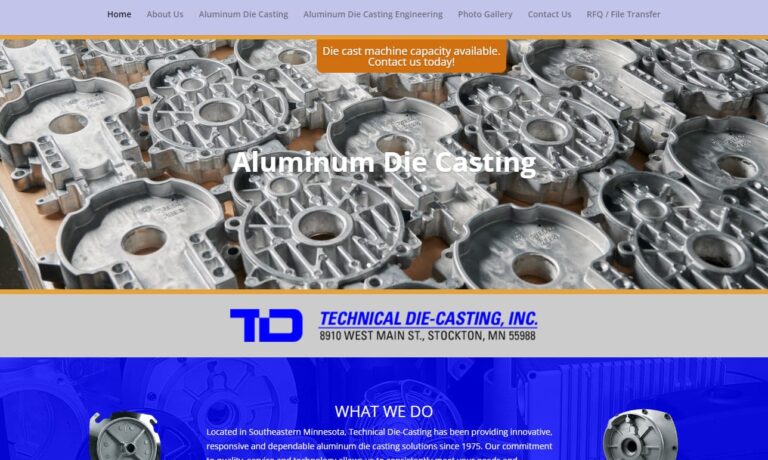Top Guidelines Of Premier Aluminum Llc
Wiki Article
What Does Premier Aluminum Llc Mean?
Table of ContentsThe Ultimate Guide To Premier Aluminum LlcFacts About Premier Aluminum Llc UncoveredWhat Does Premier Aluminum Llc Mean?Facts About Premier Aluminum Llc Revealed
(https://www.ted.com/profiles/48417046)
Generally, a purchaser's main obligation was to locate competent and responsive vendors. In many cases, purchasers thought that any kind of supplier going to contractually fulfill the purchase need was qualified. Using low cost and unqualified providers can trigger quality issues, and wasted time and money in the long run. To assist you via the process, here are some things to think about when choosing the best metal casting vendor.
A company that just uses the investment spreading procedure will attempt to sell you on why that procedure is best for your application (Foundry). However what if making use of the sand casting procedure is best for you and your requirements? Instead, look for a provider that uses a series of casting processes so the very best alternative for YOU is picked
If collaborating with a single resource for all of your casting requires is very important to you, the provider requires to be diverse in its abilities. When integrated with various other integrated capacities, this can aid simplify and press the supply base. When picking the appropriate spreading vendor, mindful factor to consider needs to be provided to quality, solution, and cost.

What Does Premier Aluminum Llc Do?
Purchasers progressively select spreading distributors that have machining capacities. This can prevent dispute if defects are found during machining. If a third event is machining, it might lead to "finger-pointing" concerning that is at fault. Is it a spreading problem or a machining concern? If the casting vendor discovers a concern throughout machining, the problem is resolved faster without disagreement over whose mistake it is.Issue or no, incorporated machining streamlines the supply chain and decreases handling time and delivery cost prior to the product makes it to the client. What do you need from your spreading distributor? Are you trying to find someone to simply supply a metal element to your doorstep or do you require much more? If you do not have in-house metallurgy experience, confirm that the distributor can provide advice in choosing the correct alloy based on your certain application.
Some factories are restricted or specialized. Make sure the vendor can satisfy all your material or alloy demands to eliminate the need for multiple distributors.
Premier Aluminum Llc - Truths

Research the distributor's site. Talk to a sales representative or business affiliate. Ask a great deal of concerns. Visit their facility. Obtain an understanding of what they can do for you and if you can see his explanation on your own developing a strong, mutual relationship with them.
Aluminum is additionally lightweight and has good corrosion resistance, making it suitable for applications where weight and sturdiness are vital aspects. Furthermore, light weight aluminum casting is an economical method of production, as it calls for much less power and sources than other approaches. Iron spreading, on the various other hand, involves pouring molten iron into a mold to develop a preferred shape.
Our Premier Aluminum Llc Diaries
Iron spreading is likewise able to endure heats, making it appropriate for usage in applications such as engine parts and commercial equipment. However, iron spreading can be much more costly than aluminum casting due to the greater expense of basic materials and the power required to thaw the iron. When choosing in between light weight aluminum spreading and iron spreading, it is essential to consider the details demands of the application.If toughness and longevity are more crucial, iron casting may be the better option. Other variables to think about consist of cost, production quantity, and preparation. To conclude, both aluminum casting and iron casting have their own unique advantages and downsides. By carefully taking into consideration the details demands of the application, makers can pick the most effective process for their product.ZheJiang Dongrun Casting Market Co,. Ltd was developed in 1995, We have remained in the spreading industry for even more than 25 years. Die spreading is the name offered to the procedure of developing complicated metal components via use mold and mildews of the component, also understood as dies. The process utilizes non-ferrous steels which do not consist of iron, such as aluminum, zinc and magnesium, as a result of the desirable residential properties of the metals such as low weight, greater conductivity, non-magnetic conductivity and resistance to corrosion. Pass away spreading manufacturing is quickly, making high production levels of components easy.
It produces more elements than any type of other procedure, with a high degree of accuracy and repeatability. For more information regarding die spreading and pass away casting materials used in the procedure, read on. There are three sub-processes that drop under the classification of die spreading: gravity pass away spreading (or irreversible mold spreading), low-pressure die casting and high-pressure die spreading. The pure metal, additionally referred to as ingot, is contributed to the heating system and kept at the molten temperature of the steel, which is after that transferredto the shot chamber and infused into the die. The pressure is then maintained as the steel solidifies. As soon as the steel solidifies, the cooling procedure starts. The thicker the wall of the component, the longer the cooling time due to the fact that of the quantity of indoor steelthat additionally needs to cool. After the part is completely cooled, the die cuts in half open and an ejection system pushes the element out. Adhering to the ejection, the die is shut for the following shot cycle. The flash is the additional material that is cast during the procedure. This have to be trimmed off utilizing a trim tool to leave simply the main part. Deburring gets rid of the smaller sized pieces, called burrs, after the trimming process. Ultimately, the element is brightened, or burnished, to provide it a smooth surface. This verified to be an incorrect test, due to the fact that the tester could cut into a piece and miss a location with porosity. Today, leading producers use x-ray testing to see the whole interior of components without cutting right into them. This permits them to a lot more properly approve or turn down elements. To reach the finished product, there are 3 primary alloys utilized as die spreading material to select from: zinc, light weight aluminum and magnesium. Zinc is just one of one of the most used alloys for die spreading due to its reduced cost of basic materials. Report this wiki page